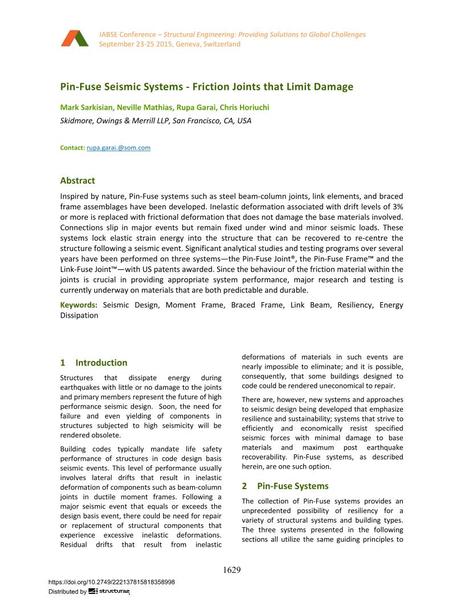Pin-Fuse Seismic Systems - Friction Joints that Limit Damage

|
|
|||||||||||
Bibliografische Angaben
| Autor(en): |
Mark Sarkisian
(Skidmore, Owings & Merrill LLP, San Francisco, CA, USA)
Neville Mathias (Skidmore, Owings & Merrill LLP, San Francisco, CA, USA) Rupa Garai (Skidmore, Owings & Merrill LLP, San Francisco, CA, USA) Christopher Horiuchi (Skidmore, Owings & Merrill LLP, San Francisco, CA, USA) |
||||
|---|---|---|---|---|---|
| Medium: | Tagungsbeitrag | ||||
| Sprache(n): | Englisch | ||||
| Tagung: | IABSE Conference: Structural Engineering: Providing Solutions to Global Challenges, Geneva, Switzerland, September 2015 | ||||
| Veröffentlicht in: | IABSE Conference Geneva 2015 | ||||
|
|||||
| Seite(n): | 1629-1636 | ||||
| Anzahl der Seiten (im PDF): | 8 | ||||
| Jahr: | 2015 | ||||
| DOI: | 10.2749/222137815818358998 | ||||
| Abstrakt: |
Inspired by nature, Pin-Fuse systems such as steel beam-column joints, link elements, and braced frame assemblages have been developed. Inelastic deformation associated with drift levels of 3% or more is replaced with frictional deformation that does not damage the base materials involved. Connections slip in major events but remain fixed under wind and minor seismic loads. These systems lock elastic strain energy into the structure that can be recovered to re-centre the structure following a seismic event. Significant analytical studies and testing programs over several years have been performed on three systems—the Pin-Fuse Joint®, the Pin-Fuse Frame™ and the Link-Fuse Joint™—with US patents awarded. Since the behaviour of the friction material within the joints is crucial in providing appropriate system performance, major research and testing is currently underway on materials that are both predictable and durable. |
||||
| Stichwörter: |
Erdbebenbemessung Energiedissipation
|
||||
